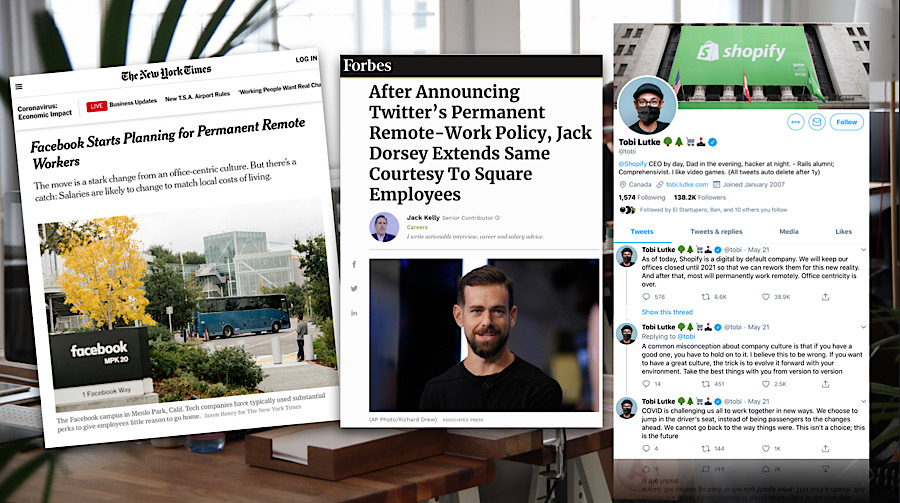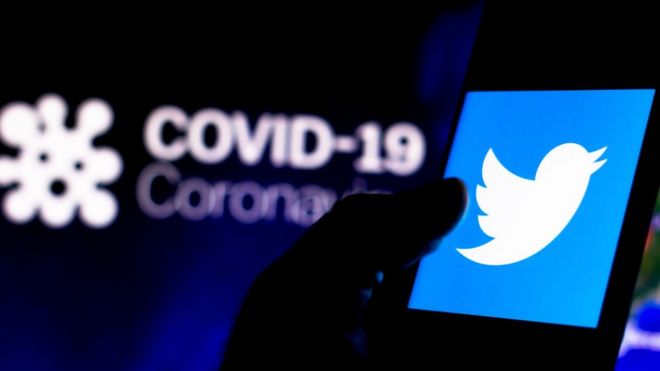5/25/2020
Facebook remote work plans

OAKLAND, Calif. — Facebook will allow many employees to work from home permanently. But there’s a catch: they will not keep their big Silicon Valley salaries in more affordable parts of the country.
Mark Zuckerberg, Facebook’s chief executive, told workers during a staff meeting that was livestreamed on his Facebook page that within a decade as many as half of the company’s more than 48,000 employees will work from home.
“It’s clear that Covid has changed a lot about our lives, and that certainly includes the way that most of us work,” Mr. Zuckerberg said.
Facebook’s decision, the first among tech’s biggest companies, is a big change for a business culture built around getting workers into giant offices and keeping them there, using free shuttle buses, free cafeterias and personal services like dry cleaning.
If other giant companies follow Facebook, tech employment will probably move away from expensive hubs like Silicon Valley, Seattle and New York, where salaries aren’t enough to buy a home.
Mr. Zuckerberg’s announcement followed similar decisions at Twitter, where employees will be allowed to work from home indefinitely.
Aaron Levie, the chief executive of the business technology company Box, wrote on Twitter that “the push happening around remote work is as game-changing for the future of tech as the launch of the iPhone” more than a decade ago.
In March, the coronavirus lockdown forced companies to send employees home. Many tech companies, including Facebook, emptied their offices before local shelter-in-place orders.
Now, more than two months later, executives are discovering that their remote workers performed better than expected.
Facebook will begin by allowing new hires who are senior engineers to work remotely, and then allow current employees to apply for permission to work from home if they have positive performance reviews.
Starting in January, Facebook’s employee compensation will be adjusted based on the cost of living in the locations where workers choose to live.
Mr. Zuckerberg said the shift will offer more benefits than inconveniences for the company. Allowing remote work will allow Facebook to broaden its recruitment, retain valuable employees, reduce the climate impact caused by commutes and expand the diversity of its work force.
5/17/2020
Twitter staff to work from home 'forever'

On Tuesday Twitter CEO Jack Dorsey told its staff of more than 4,000 people across its global offices that they can work from home "forever" if they choose, when it
reopens after the coronavirus
pandemic ends.
He said, "Opening offices will be our decision. Coming back will be your decision."
Twitter said it will not be one
of the first to return to offices and when they open, it will be "careful,
intentional, office by office and gradual".
Sree Sreenivasan, a Loeb Visiting
Professor of Digital Innovation at the Stony Brook University School of
Journalism, said it is "an era-defining moment ".
"We can learn a lot from
Silicon Valley about workplace flexibility. Some believe that working from home
is stealing from the boss and face time in the office is extremely important. But
people are proving they can be far more productive and get tasks done working
from home. A lot of people tell me they are working harder at home and are exhausted,"
he added.
Companies around the world are
working out how to re-open offices gradually while introducing new social
distancing measures.
Earlier this month Google and
Facebook said their staff can work from home until the end of the year.
From BBC (edited)
The first female mechanic in Nigeria (captions)
You can also watch the video by clicking on the Play Button
https://edition.cnn.com/videos/world/2020/03/27/great-big-story-nigeria-female-car-mechanic-gbs.great-big-story/video/playlists/great-big-story-vod/
Italy is ready to reopen
 |
| Preparing a barber shop in Rome |
ROME - The
Italian government will begin lifting coronavirus limits on Monday, but
tourists will face stringent rules in hotels, restaurants and on beaches.
Although there
are general guidelines for reopening for the entire country, each region can
adopt its own changes depending on the particular situation.
The
national government may decide to close certain areas again at any time if there
is a spike in new coronavirus infections.
Italians
can now walk the streets of their cities, wearing protective masks and gloves,
and beginning Monday, all shops can reopen to the public, with new rules.
Social distancing of at least one meter must continue to be maintained, and
only a designated number of people at a time will be able to enter stores.
Italians
will be able to return to bars, restaurants and beauty salons. Social
distancing rules apply, and waiters and owners will have to wear face masks at
all times.
Italians
can travel within their regions starting Monday, and from region to region and
abroad beginning June 3. Tourists can return starting June 3, as well.
Additionally,
church services will resume, though only a certain number will be allowed to
attend. Churches will be completely sanitized at the end of every day.
Schools,
universities, cinemas and theaters will remain closed for the time being.
 |
| Gondoliers in Venice practise and wait for tourists to return to the city. |
From VOA News and AP (edited)
5/12/2020
5/08/2020
Corona beer and Coronavirus

Picture
this. You are lounging on a faraway beach and have nothing to do but listen to
the sound of rolling waves. The routines in your life are distant memories. In
their place, palm trees rustle and turquoise water stretches to the horizon. A
beautiful somebody relaxes at your side, safe and free.
If this
sounds like an upgrade on life in lockdown, you now know why the marketing for
Corona beer has been so successful. In the 1980s Grupo Modelo, the Mexican
brewer that created it, began exporting Corona to the United States, projecting
an image of “fun, sun and beach”. Unlike branding for other beers, which merely
invited drinkers to unwind, Corona offered escape.
Save for
Huawei, a Chinese telecoms mammoth, Corona is the most valuable global brand
not from the rich world, according to Interbrand, a consultant. Or it was: 2020
has been riddled with rotten luck.
Grupo
Modelo began producing Corona in Mexico City in the 1920s. The crown that
adorns the beer’s label and bottle-cap first appeared in 1963. Soon afterwards,
Corona beer began to conquer the world. AB InBev, the giant brewer, bought
Grupo Modelo in 2013. By 2018, estimated Forbes, Corona sales
reached $6.6bn.
In 2020,
thanks to the pandemic, the word “corona” is now a battlefield on which glamour
and calamity collide. Whether “corona”, a year or two from now, elicits
thoughts of beaches and limes or of hospital beds and quarantines, is
potentially a question worth billions.
The first
shots fired in this battle were jokes. As the coronavirus spread, amateur
comedians flocked to Corona’s Instagram account. Some sardonically urged the
brewer to “please stop killing innocent people”. Others suggested that Corona
change its name to something with fewer negative connotations, “like Ebola”.
Corona’s social-media team stopped posting on March 13th.
A brand’s
power lies in its ability to trigger subconscious associations in consumers’
minds. But who can now hear the word “corona” without thinking of plague? Many
cite the unfortunate precedent of Ayds, a weight-loss candy whose sales
plummeted in the 1980s. Its makers changed its name.
Any
evidence of lasting damage to the brand will be slow to emerge, points out Tom
Meyvis, a professor of marketing at the Stern School of Business, at New York
University.
Those who
know Corona note that it has defied the odds to reach the top. Mexico had no
beer-making pedigree with which to win foreign drinkers’ trust, but images of
Mexican beaches soon became a novel, glamorous and world-beating selling-point.
Corona’s transparent glass bottle causes the beer to spoil easily when exposed
to sunlight, and a “nothing to hide” marketing slogan was a hit.
Corona took
advantage of loosening trade barriers to enter new markets, and became a
national ambassador for Mexico in faraway places. By the 1990s the secretary
for commerce, Jaime Serra Puche, was boasting that “Mexico exports two fluids:
crude oil and Corona”.
In April the
Mexican government belatedly ordered the closure of all non-essential
activities. Unlike making wine in France or beer in the United States, brewing
in Mexico was declared “non-essential”. Within weeks the national supply of
Corona dried up. Local supermarkets in
Mexico City have neither Corona nor any other domestic brew left on its shelves;
there are only a few imported beers to choose from.
It is a
happy story cut short by the unlucky events of 2020.
- But what is Corona to do if damage to the brand is unavoidable?
- Should they change the name? Should they keep it?
From The Economist (edited)
5/07/2020
A gym's equipment
Be Strong
Gym owner Drew Whitted (photo) didn't want his
clients to give up on their fitness goals while abiding by Illinois'
stay-at-home order. So, he told members to come pick up equipment and take
it with them, free of charge.
Whitted is
among the many across the US who had to close his business' doors amid the
coronavirus pandemic. But, he knew many of his members were missing their
regular workout routines -- so he told members they could sign up to check out
items to use at home while the studio is closed.
About 80
members of Be Strong Gym took Whitted up on his offer. In total, the gym
distributed about $40,000 worth of equipment, including barbells, weights,
exercise bikes, rowers and mats.
"It
was awesome," Whitted said. "We cleared the gym out in less than two
hours."
The gym has
been holding online training sessions every day, so members can work out
together virtually.
Currently
eight people work at the gym, and Whitted said he plans to keep paying them for
as long as the shutdown lasts.
"My
staff will not miss a single dollar for their paycheck for as long as it
takes," he said.
Before the
pandemic hit Paulette Cocco used to work out at Be Strong three or four times a
week. She was able to borrow a barbell, some weights and a heavy wall ball.
She said the
online workouts have helped keep the gym's community spirit. "So you see
people posting their pictures and their workouts and makes you feel ...
pressured, almost like 'I gotta get my workout in '"
Whitted offered
members a free month to make up for the time that the gym has been closed. But he
got calls from several members insisting the gym still take their dues.
"I
personally don't want to take that offer because he's been so generous,"
Cocco said. Her oldest daughter and her husband have started working out with
her, and they might join the gym when it reopens.
Whitted
said one pro of people having to stay at home is that many are getting their
families involved in their workouts.
"Now I
see a whole family getting through this tough time doing these workouts
together, bonding together, becoming healthier and happier together as a family
unit. I expect the equipment will flow back in once I can reopen because
members will be excited to work out together again.”
From CNN (edited)
5/05/2020
Subscribe to:
Comments (Atom)











